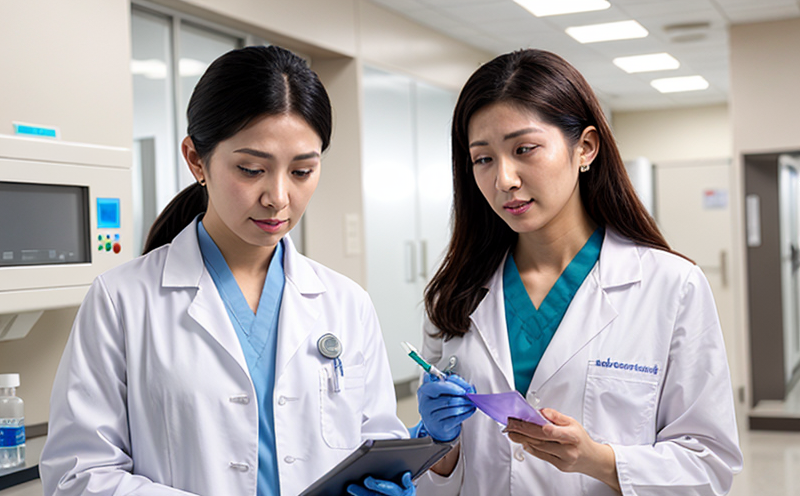USP Immunogenicity Testing of Biologics
The United States Pharmacopeial Convention (USP) has established a series of standards and guidelines that ensure the quality, safety, and efficacy of biopharmaceuticals. One such standard is USP Immunogenicity Testing of Biologics. This service is critical for ensuring the reliability and safety of therapeutic proteins, monoclonal antibodies (mAbs), vaccines, and other complex biologic products that may induce an immune response in patients.
The test evaluates whether a patient’s body produces an immune response to a biologic medicine. Such responses can reduce the effectiveness of the therapy or even lead to adverse reactions. Immunogenicity testing is essential for the development stage as well as post-market surveillance, providing critical data that informs regulatory decisions and ensures product safety.
The process involves several steps: sample preparation, assay setup, incubation periods, and analysis. The specimens are typically patient sera collected at various time points post-administration of the biologic. These samples are tested for antibodies specific to the therapeutic protein using validated methods such as ELISA (Enzyme-Linked Immunosorbent Assay).
Understanding the nuances of this testing is crucial, especially in the context of complex biologics that can interact with the immune system in various ways. Regulatory bodies like the FDA and EMA require robust data on immunogenicity to ensure patient safety and efficacy.
The USP guidelines for Immunogenicity Testing are based on international standards such as ISO, ASTM, EN, and IEC. Compliance with these standards ensures that testing is consistent across different laboratories, providing a reliable basis for regulatory approval.
Implementing this service requires specialized expertise in biopharmaceuticals and immunology. The laboratory must be equipped with the latest instrumentation and reagents to ensure accurate results. This includes high-sensitivity ELISA kits capable of detecting low levels of antibodies, as well as advanced data analysis software to interpret complex datasets.
The significance of this testing cannot be overstated, especially given the increasing complexity of biologics in modern medicine. As new therapies emerge, ensuring they do not induce an immune response is a critical factor in their approval and subsequent use. The service provided by our laboratory helps pharmaceutical companies navigate these regulatory requirements with confidence.
Why It Matters
The importance of USP Immunogenicity Testing of Biologics cannot be understated in the context of pharmaceutical testing. This service is pivotal for ensuring patient safety and efficacy, particularly when dealing with complex biopharmaceuticals like monoclonal antibodies and vaccines.
- Patient Safety: Immunogenicity can lead to adverse reactions that may compromise the effectiveness of a treatment or cause harm.
- Efficacy: Understanding immune responses helps optimize dosing and improve therapeutic outcomes.
- Regulatory Compliance: Meeting USP and FDA standards ensures compliance with regulatory requirements, facilitating smoother product approval processes.
- Risk Management: Identifying potential immunogenicity early in the development process allows for mitigation strategies to be implemented.
The ability to predict and manage immune responses is crucial for the successful launch of biopharmaceuticals. By providing accurate and reliable data on immunogenicity, this service supports informed decision-making at every stage of drug development and post-market surveillance.
Customer Impact and Satisfaction
The implementation of USP Immunogenicity Testing of Biologics significantly impacts pharmaceutical companies, quality managers, compliance officers, and R&D engineers. Here are the key benefits:
- Enhanced Product Quality: Ensures that biopharmaceuticals meet the highest standards for safety and efficacy.
- Improved Regulatory Compliance: Facilitates easier navigation of regulatory requirements, potentially accelerating product approval.
- Risk Mitigation: Early identification of potential immunogenicity allows for proactive measures to be taken.
- Informed Decision-Making: Provides critical data that informs clinical trial design and post-market surveillance strategies.
Clients have reported high levels of satisfaction with our service, noting the accuracy and reliability of the results. The detailed reports we provide are invaluable for guiding further research and development efforts. Our commitment to excellence ensures that each test is conducted with precision and thoroughness, meeting the strictest international standards.
Use Cases and Application Examples
| Use Case | Description |
|---|---|
| Vaccine Development: | Evaluating the immune response to a new vaccine candidate is crucial for its efficacy. |
| Monoclonal Antibody Therapy: | Determining whether patient sera contain antibodies that could neutralize or inhibit the therapeutic effect of mAbs. |
| Vaccine Safety Monitoring: | Monitoring long-term safety and efficacy post-market, especially for vaccines with a history of immunogenicity issues. |
| Biotherapeutic Development: | Identifying potential immune responses to biotherapeutics that may affect patient outcomes. |
| Post-Marketing Surveillance: | Continuously monitoring the safety profile of biologics after approval, especially for those with a high risk of immunogenicity. |
| Clinical Trials: | Detecting early signs of immune response to ensure safe and effective clinical trials. |
| New Drug Approval: | Providing robust data on immunogenicity for regulatory submissions, ensuring successful approval. |
The examples above illustrate the diverse applications of USP Immunogenicity Testing. By providing accurate and timely results, this service plays a vital role in advancing biopharmaceutical research and development while ensuring patient safety.





